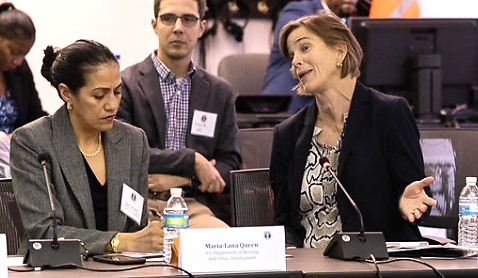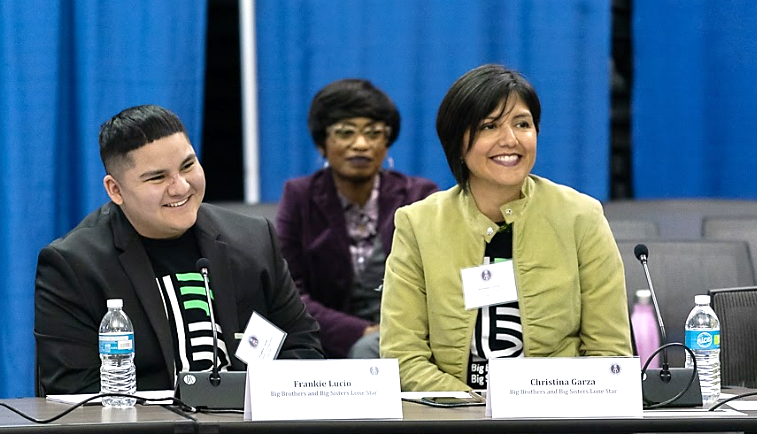
On December 10, 2019, OJJDP hosted a public meeting of the Coordinating Council on Juvenile Justice and Delinquency Prevention. The meeting highlighted OJJDP, Department of Labor, and Department of Housing and Urban Development programs that support mentoring services for at-risk and delinquent youth. In addition, the event featured testimonials from mentees on the positive impact mentoring can have on a young person’s growth and development.
OJJDP Associate Administrator James Antal reported that the Office has awarded nearly $957 million in grants to mentoring organizations between fiscal years (FYs) 2008 and 2019. In FY 2019 alone, through its Mentoring Opportunities for Youth initiative, the Office awarded more than $81 million in grants. OJJDP’s mentoring work focuses on improving the effectiveness of youth mentoring services. “It’s really focusing on quality and making sure that program mentors are properly trained, that they are supported, and that the [mentor-mentee] matches are of high quality,” said Mr. Antal. To enhance the quality of mentoring services, OJJDP's National Mentoring Resource Center provides training and technical assistance as well as a wealth of information and resources to mentoring practitioners. The center’s resources are developed and overseen by a board of nationally renowned researchers with expertise in what works in youth mentoring.
 Jennifer Kemp (r.), Director of Youth Services in the Department of Labor’s (DOL’s) Office of Workforce Investment, and Maria-Lana Queen (l.), Liaison for Federal Interagency Youth Initiatives at the Department of Housing and Urban Development’s (HUD’s) Office of Public and Indian Housing, discussed DOL and HUD programs that include mentoring components.
Jennifer Kemp (r.), Director of Youth Services in the Department of Labor’s (DOL’s) Office of Workforce Investment, and Maria-Lana Queen (l.), Liaison for Federal Interagency Youth Initiatives at the Department of Housing and Urban Development’s (HUD’s) Office of Public and Indian Housing, discussed DOL and HUD programs that include mentoring components. Following Ms. Kemp’s presentation, Maria-Lana Queen, Liaison for Federal Interagency Youth Initiatives in the Department of Housing and Urban Development’s (HUD’s) Office of Public and Indian Housing shared information about HUD programs that embrace youth mentoring approaches as one component in their overall service delivery. HUD awards funding to the nation’s more than 3,200 public housing authorities, which are primarily responsible for providing HUD-assisted housing. The housing authorities also provide an array of services to help low-income families achieve economic mobility and self-sufficiency. HUD’s Jobs Plus Initiative focuses on work readiness, job placement, and technology skills; the Resident Opportunities and Self-Sufficiency (ROSS) Service Coordination offers comprehensive case management and referral to services, including opportunities for positive youth development; ROSS for Education supports post-secondary education and financial literacy; and the Juvenile Reentry Assistance Program provides legal assistance to support justice-involved youth.
The meeting concluded with a panel discussion featuring two pairs of mentees and mentors who participate in OJJDP-supported national mentoring programs.
 Big Brothers Big Sisters mentee Frankie Luzio and mentor Christina Garza of the FBI’s Houston, TX, Field Office enjoy a light-hearted moment during a panel discussion on the benefits of mentoring.
Big Brothers Big Sisters mentee Frankie Luzio and mentor Christina Garza of the FBI’s Houston, TX, Field Office enjoy a light-hearted moment during a panel discussion on the benefits of mentoring.The panel discussion also included remarks from Anna Piccirilli, Director of Academic Success at Boys and Girls Clubs of Annapolis and one of her young mentees, Amira. Amira is in the fifth grade at Germantown (MD) Elementary School and a member of the Wiley H. Bates Boys and Girls Club in Annapolis. She goes to the club almost every day and has participated in a wealth of activities, including STEM Mentoring, Smart Girls, Healthy Habits, and Rooted in Reading. “My favorite part is getting to spend time with Ms. Anna and her helping me with homework and problems I have going on at home and problems I have with people at Boys and Girls Club,” said Amira. “You get to do different fun activities and your homework. If you’re struggling with your homework, there’s always somebody there to help you.”
The Juvenile Justice and Delinquency Prevention Act of 1974, as amended, established the Council as an independent body to coordinate federal programs related to delinquency prevention and missing and exploited children. The Council comprises 9 ex officio members, 4 affiliate members, and 10 nonfederal practitioner members named by the President and Congress. The Attorney General is the ex officio Chair of the Council and the Administrator of OJJDP is the ex officio Vice Chair. Additional ex officio members include the Secretaries of the Departments of Health and Human Services (HHS), Labor, Education, Homeland Security, and Housing and Urban Development; the Director of the Office of National Drug Control Policy; and the Chief Executive Officer of the Corporation for National and Community Service. In addition, four affiliate federal agencies are represented on the Council: the Departments of Agriculture, Defense, and Interior, through their respective Secretaries and designees; and HHS’ Substance Abuse and Mental Health Services Administration, through its Administrator. In accordance with the Federal Advisory Committee Act, the Council holds public meetings up to four times a year in which members discuss activities to facilitate and support cross-agency coordination.
